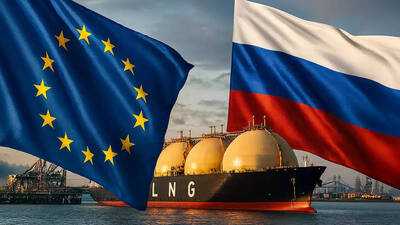EU gas imports: Bloc to phase out Russian energy by 2027; aims for full independence
The European Union has agreed to phase out its remaining gas imports from Russia by the end of 2027, a move aimed at ending its long-standing energy dependence on Moscow.
The decision was taken by EU energy ministers during a meeting in Luxembourg on Monday, who approved a plan by the European Commission to gradually eliminate both pipeline and liquefied natural gas (LNG) imports from Russia, subject to approval by the European Parliament.

Denmark’s energy minister Lars Aagaard, whose country currently holds the EU presidency, described the plan as a “crucial” step toward making Europe energy independent, according to news agency AFP .
The phased ban will prohibit Russian gas under new contracts from January 1, 2026, with a transition period for existing agreements.
Short-term contracts will be allowed until June 17 next year, while long-term deals can continue until January 1, 2028.
Most EU countries supported the plan, but Hungary and Slovakia, landlocked nations still reliant on Russian pipeline gas, opposed it.
As per AFP, Budapest’s top diplomat Peter Szijjarto warned, “The real impact of this regulation is that our safe supply of energy in Hungary is going to be killed”.
Spain, which had initially raised legal concerns, said it would back the deal, acknowledging the risks of dependence on a single external supplier, reported Bloomberg .
The EU is pursuing a two-pronged strategy, part of its RepowerEU initiative, to end reliance on Russian energy following Moscow’s invasion of Ukraine in 2022.
Alongside the gradual ban on pipeline gas, the Commission has proposed phasing out Russian LNG by January 2027.
EU officials will now negotiate with the European Parliament, which has called for a faster exit from Russian gas and a halt to oil imports starting next year, aiming for a final deal before the end of 2025, according to Bloomberg.
Russian gas still accounts for around 13 per cent of EU imports in 2025, valued at over €15 billion annually.
The EU’s energy commissioner Dan Jorgensen highlighted the broader significance of the move, “This is not just for the present conflict. It’s for the future. Never again should we make this mistake”.
The decision also aligns with broader transatlantic energy cooperation, with the US-EU joint statement pledging $750 billion in energy deals over the next three years, encouraging Europe to source more LNG from the US and reduce dependence on Russian fuel.
The decision was taken by EU energy ministers during a meeting in Luxembourg on Monday, who approved a plan by the European Commission to gradually eliminate both pipeline and liquefied natural gas (LNG) imports from Russia, subject to approval by the European Parliament.
Denmark’s energy minister Lars Aagaard, whose country currently holds the EU presidency, described the plan as a “crucial” step toward making Europe energy independent, according to news agency AFP .
The phased ban will prohibit Russian gas under new contracts from January 1, 2026, with a transition period for existing agreements.
Short-term contracts will be allowed until June 17 next year, while long-term deals can continue until January 1, 2028.
Most EU countries supported the plan, but Hungary and Slovakia, landlocked nations still reliant on Russian pipeline gas, opposed it.
As per AFP, Budapest’s top diplomat Peter Szijjarto warned, “The real impact of this regulation is that our safe supply of energy in Hungary is going to be killed”.
Spain, which had initially raised legal concerns, said it would back the deal, acknowledging the risks of dependence on a single external supplier, reported Bloomberg .
The EU is pursuing a two-pronged strategy, part of its RepowerEU initiative, to end reliance on Russian energy following Moscow’s invasion of Ukraine in 2022.
Alongside the gradual ban on pipeline gas, the Commission has proposed phasing out Russian LNG by January 2027.
EU officials will now negotiate with the European Parliament, which has called for a faster exit from Russian gas and a halt to oil imports starting next year, aiming for a final deal before the end of 2025, according to Bloomberg.
Russian gas still accounts for around 13 per cent of EU imports in 2025, valued at over €15 billion annually.
The EU’s energy commissioner Dan Jorgensen highlighted the broader significance of the move, “This is not just for the present conflict. It’s for the future. Never again should we make this mistake”.
The decision also aligns with broader transatlantic energy cooperation, with the US-EU joint statement pledging $750 billion in energy deals over the next three years, encouraging Europe to source more LNG from the US and reduce dependence on Russian fuel.
Next Story